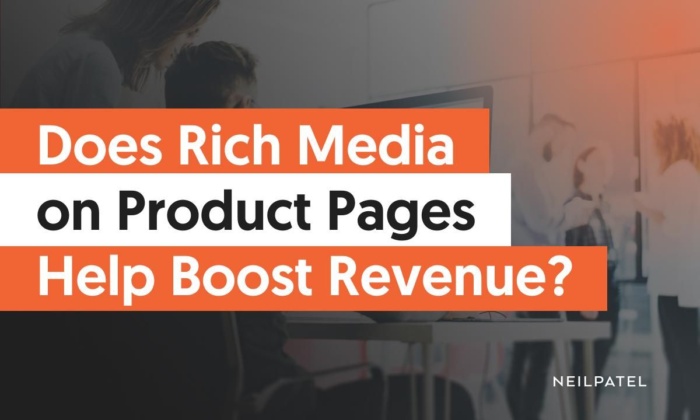
Rich media – including videos, gifs, audio recordings, and infographics – is a popular tool used to convert users on landing pages and in digital advertisements.
Does it have the same impact on conversion rates and revenue on product pages? That’s the million-dollar question for many e-commerce website owners and marketers looking to increase the conversion rate of their own product pages.
So if you’re asking yourself, “should I make room for rich media on my product pages?”, you’ll find your answer to that question and more below.
Why Is Rich Media Important?
Rich media is any feature or website element that encourages users to interact with it. This type of content is often used on landing pages, in digital advertisements, and on product pages.
The most widely used example of rich media on product pages is video.
So, why is rich media important?
In e-commerce, rich media enables the viewer to interact with the product before they convert. This includes visualizing product installation, seeing the product in use, and even learning tips and tricks for best product usage.
This isn’t a new trend. YouTube videos for e-commerce have been around for years. However, the importance of rich media in product selling only seems to grow.
Beyond engagement, product videos and other forms of rich media can build trust with potential customers. After all, to see is to believe. Product videos may help to ease users’ concerns or even highlight features that get potential customers more excited over the product. This essentially means you can sell more with your videos.
Perhaps most importantly, especially as it relates to the topic at hand, is that Google is increasingly prioritizing webpages with video content. In fact, Google may even turn webpages with video content into rich snippets. With an average conversion rate of 58% as compared to 41% for non-rich results, it’s easy to see how your website may benefit from more video content.
Common Product Page Conversion Methods
The use of rich media on product pages isn’t the only conversion method that website owners may use.
A few other methods include:
- Trust badges, like an icon from the Better Business Bureau
- Compelling product copy
- Customer ratings and reviews
- Customer-generated content (e.g., product images, product videos)
- Frequently asked questions
- Estimated delivery dates
- Low inventory messaging (e.g., “Only 3 left!”)
There are plenty of ways to boost conversion rates on your product page. We recommend split testing to truly determine how effective each of the above methods is with your audience.
Rich Media: Does It Boost Revenue For Product Pages?
We know there are many benefits, as outlined above, to including rich media on product pages. We also know that rich media advertisements tend to see higher conversion rates and revenue than their non-rich media counterparts. In fact, rich media ads have been shown to outperform standard ads by up to 267%!
To truly understand whether rich media has an impact on product page performance, though, we need to perform analysis across multiple websites.
What Our Data Shows Us
For our analysis, we selected six top name-brand websites from the baby sleep sack industry. Of these six websites, we chose the top-performing pages from each as of August 19th, 2022. The goal of this analysis was to determine if videos helped boost estimated traffic revenue, among other related metrics.
In addition to rich media, we’ve also included other factors that may impact the web page’s performance.
Rich Media, Product Schema and Quality Information: Kyte Baby
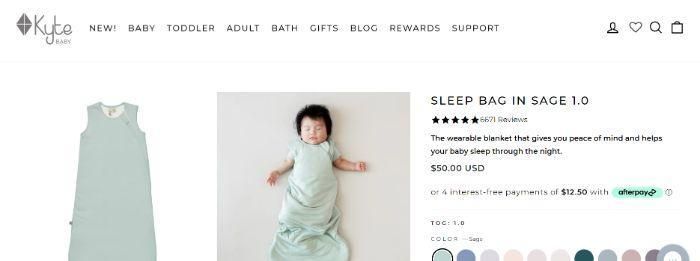
On the Kyte Baby product page for the Sleep Sack in Sage 1.0, a video is available.
The website ranks for 310 organic keywords with 2.4 thousand organic traffic visits per month. As for organic traffic value, or the revenue attributed to organic traffic visits, this page nets $21 per month.
Let’s consider what else the product page might do well.
First and foremost, Kyte Baby does have product schema implemented. Product schema, or product structured data, enables Google to display product listings in a richer way. With product schema, Google can enhance both product snippets in rich results and merchant listing experiences.
This includes displaying price, availability, and even ratings and reviews:

In addition, the Kyte Baby product page also contains a high word count (1,284 words on the page, NOT including the 6,524 reviews for the product). This offers ample opportunity to optimize the listing for search engines while providing all necessary information to customers.
Product Reviews Add Over 1000 words to Love to Dream’s Product Pages
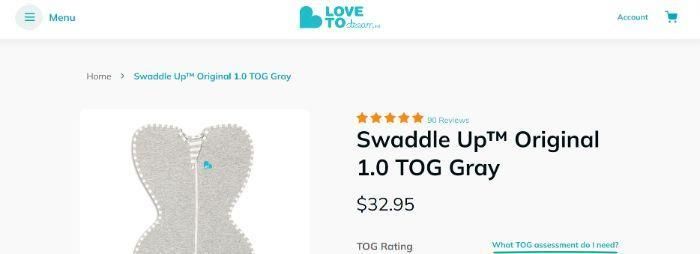
The second product page on our list, Love to Dream, also featured a video on the product description page during the time of our analysis. The video appears to have been removed more recently, though our analysis only focuses on the time when the video was present.
The URL ranks for 579 organic keywords, it draws in 3,000 in average monthly traffic, and it has an organic traffic revenue of $977.
Similar to Kyte Baby, Love to Dream does have product schema implemented. The Love to Dream product page has a fairly low word count (653 words), though product reviews are also found on the page which adds an additional 1,134 words to the listing.
Aden + Anais: How A Small Product Image Gallery and Low Word Count Hurt Performance
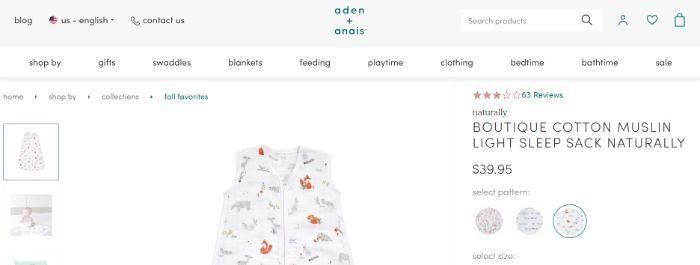
The first on our list not to include a video on the product description page, the Aden + Anais Boutique Cotton Muslin Light Sleep Sack features a minimal gallery with just two images.
The product page ranks for 98 organic keywords with an average monthly organic traffic of 122. The estimated net dollars in organic traffic revenue is $39, which means this product page is the second lowest performer on our list.
Aside from the minimal image gallery, the page contains a minimal word count (346 words) which doesn’t include the word count from the 63 reviews.
One thing to note here is that the reviews average 3.1 stars which may account for the poor performance we’re seeing. A low average review count is likely negatively impacting conversion. After all, 93% of consumers say online reviews impact their buying decision. On top of that, most won’t engage with a business or product rating below 3.3 stars.
Sleeping Baby: The Unseen Factors That Impact SERPs

Sleeping Baby’s The Classic Heather Zipadee-Zip Swaddle Transition® product description page has a modest gallery (just five images including a size guide) with no video or other rich content available.
With 23 organic keyword rankings, 11 in average monthly organic traffic, and an estimated $3 in organic traffic revenue, Sleeping Baby is the poorest-performing product description page in our analysis.
This is an anomaly among our analyzed pages as product schema is implemented, the page has a decent word count (401 not including product reviews), and it has over 2,400 reviews. All other things being equal, you might expect better performance results. As we know, though, Google is likely considering dozens of unseen factors.
Magic Merlin: How Few Reviews and Sparse Product Descriptions Directly Affect Product Page Rankings
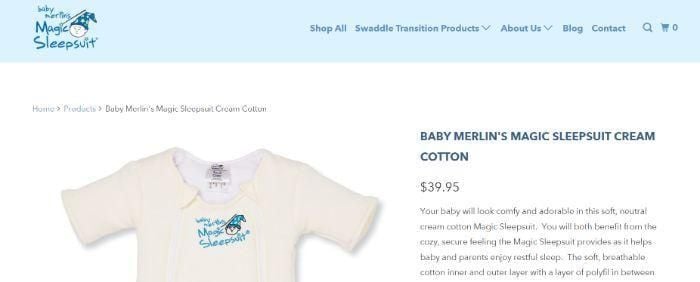
The product description page for Baby Merlin’s Magic Sleepsuit in Cream has a gallery of varied images, including those with text-to-outline key product features. The page does not include a video or other forms of rich content. The product description page does have product schema implemented.
With 63 organic keywords, 90 average monthly traffic visits, and a traffic value of just $6, Magic Merlin is our second-to-worst performing product page in our analysis.
When considering other factors that may play a role in poor performance, consider that there are only 112 words on the page and there are no reviews of the product.
Of the six listings we’ve analyzed, Magic Merlin is the only one to receive a passing score for Core Web Vitals. These are a set of factors that Google considers when evaluating the page’s overall user experience. Specifically, Core Web Vitals measures:
- Largest contentful paint: How long it takes for the main content of a web page to load.
- First input delay: The delay in time from when a visitor first interacts with the page (e.g. clicks a link, scrolls through a carousel) to when the browser is able to react.
- Cumulative layout shift: A measurement of the shifting of website elements (e.g. font, buttons, images) while the page is still loading. This can disorient visitors.
So while Magic Merlin performs well in user experience, we can see that other factors (e.g., no rich content, low word count, no reviews) may play a larger role.
Dreamland Baby Co.: Rich Media and Product Schema are Necessary For Product Pages
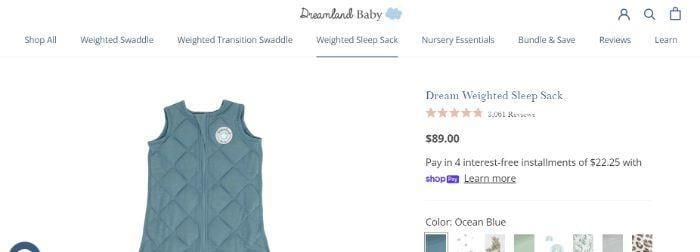
Last on our list is Dreamland Baby Co.’s product page for the Dream Weighted Sleep Sack.
The product page has a gallery of 15+ images, but no product video is included. The product page ranks for 538 organic keywords with 3.8 thousand in average monthly organic traffic and an estimated net of $640 in traffic revenue.
Dreamland Baby Co. seems to turn the previous results on their head, as it outperforms the two listings with videos present when it comes to organic keyword rankings and monthly organic traffic.
To stir further intrigue, Dreamland Baby Co. does not have product schema implemented so it’s not benefiting from any enhanced Google search results listings. It does contain a decent word count on the page (1,029 words, not including the word count from the 3,000+ reviews).
Insights on Rich Media and Product Pages
If rich media was the be-all-end-all for product page conversion, you would expect to see sites like Kyte Baby and Love to Dream outperform the other ones on our list. That’s not the case, however.
Kyte Baby and Love to Dream were the third and second best-performing web pages, respectively. Dreamland Baby Co., a web page without a video and even without established product schema, performed the best among all six websites analyzed when looking at overall organic keyword universe.
Why might that be?
With a whopping 3,000 reviews, Dreamland Baby Co. obviously has high engagement and high customer satisfaction. These likely play a factor in its success within the organic search results.
So, can videos increase conversions?
While video can be a useful conversion tool to build revenue, they are best used on pages that are already well-constructed and functional. A video cannot make up for a failing Core Web Vitals score or poor SEO practices such as lack of product schema. Shift your focus to your web page’s structure first and foremost before adding extraneous content such as videos.
FAQs
Do you still have questions about rich media on product pages? Here are some answers to frequently asked questions.
Where should I include rich media or videos on my product pages?
When it comes to displaying rich media and other videos on your product pages, the best place is in the image gallery or carousel. This will ensure the content is above the fold and in a place where customers may think to look for them first.
What is rich product content?
Rich product content includes any descriptions, images, or video that is used to help both search engines and individual readers get a better understanding of the product and its uses.
What is e-commerce rich content?
E-commerce rich content is an umbrella term that includes any sort of rich media for an e-commerce page. This can range from your basic product images to more complex offerings like video and augmented reality.
What are the benefits of rich media in content?
Rich media has a variety of uses in content. As a start, it can provide a valuable graphical supplement to any points you want to make in your copy. Some content is better illustrated in rich media form than it is in text. In addition, having rich media allows your piece to have a broader appeal than if the piece was just text.
Do product videos help boost conversions?
Product videos are elements that may help boost conversions if all other factors are already implemented, such as product schema and a passing Core Web Vitals score.
How long should my videos be?
A good rule of thumb is to keep the video under two minutes in length. This will ensure the viewer’s attention doesn’t stray.
Do I need to optimize my videos or rich media?
There are a few general video optimization rules to follow. These include using a video streaming service for quality and speed and only loading your video once all other content elements on the page have loaded.
Conclusion
There is no doubt that rich media, especially videos, can elevate your product pages. That assumes, however, that all other important elements and factors of a product page have been implemented and considered.
For the best results, you should add videos to product pages that have already been optimized for user experience and SEO. This includes considering your score on Core Web Vitals and whether you have product schema set up for search engine optimization.
Have you seen growth in conversions since adding rich media to your product pages?
Does Rich Media on Product Pages Help Boost Revenue? posted first on Kissmetrics Blog
Comments
Post a Comment